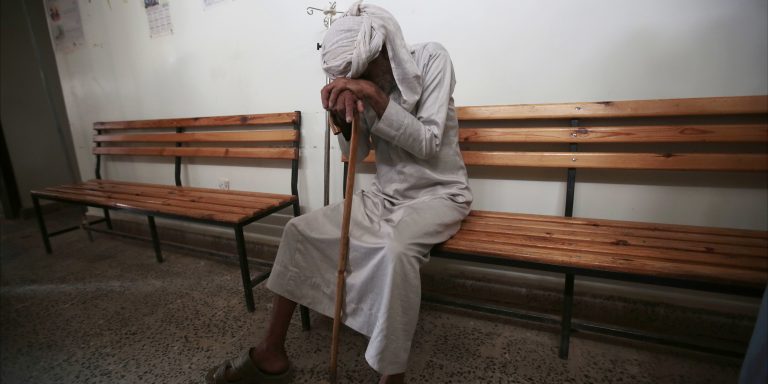INTELBRIEF
November 14, 2017
TSC IntelBrief: Blockade and Starvation in Yemen

• On November 13, a Saudi-led coalition said it would end a blockade of air and sea ports controlled by the government of Yemen but leave all other ports closed.
• Had it continued, the blockade threatened millions of starving Yemenis with famine and death.
• Starvation and cholera continue to spread in Yemen, both a direct result of the U.S.-supported war.
• Yemen is a perfect storm of failed goals: Iran’s influence in the country has increased; al-Qaeda in the Arabian Peninsula (AQAP) is expanding; and increased air strikes continue to cause massive civilian death and suffering, while making no gains on the ground.
The humanitarian catastrophe in Yemen is nearing a tipping point towards total disaster, with no indications of a peaceful resolution or even lessening of the war that began in 2015. A cholera epidemic could claim its millionth victim by the end of the year, while millions are starving. Perhaps the sole positive development in recent weeks came on November 13, when the Saudi-led coalition announced it would lift a blockade of air and sea ports controlled by Yemen’s government. The move followed growing criticism of Riyadh, which blocked all the country’s ports after Yemen’s Houthi rebels fired a ballistic missile at the Saudi capital on November 4. Saudi officials also requested talks with the United Nations on ways of improving humanitarian deliveries and access to care and food to Yemen, while still preventing weapons from being smuggled to the Houthis.
Re-opening major ports, including Aden and Mukalla, is welcome news, but will do little to alleviate the brutal war-induced malnutrition afflicting much of northern Yemen. Increased food costs, driven by scarcity as well as delays and military checkpoints, are forcing many Yemeni civilians to rely entirely on humanitarian aid, with distribution hampered by both the blockade and the war. According to the World Food Program (WFP) 17 million Yemenis — 60 per cent of Yemen’s population — suffer from food insecurity and risk severe hunger or starvation. Had the full blockade continued, the WFP warned some 6 million people would have been at greater risk of dying, including 27,000 children receiving urgent nutritional care.
Saudi officials insist the missile attack on Riyadh involved an Iranian device assembled and launched by Houthi rebels with the help of Iranian Revolutionary Guards. While the attack apparently triggered the ports blockade and a round of intensified air strikes, it’s one episode in a war that’s been a disaster for all involved. For Saudi Arabia, Yemen is a perfect storm of failed goals. Riyadh is trapped in a quagmire, unable to defeat Houthi rebels who are far more tied to Iran now than when the war began. Iran has actually increased its influence in the country, al-Qaeda in the Arabian Peninsula (AQAP) is expanding, and the Saudi coalition’s response — increased air strikes — will cause more civilian death and suffering while not changing the situation on the ground.
The Trump administration has been fully behind Saudi Arabia as it wages an increasingly assertive campaign against Iran throughout the Middle East. The U.S. Air Force has helped the Saudi coalition with mid-air refueling and targeting support since the Yemen war began. While the U.S. continues to frame its support as part of its counterterrorism strategy, the war is actually helping AQAP, since Yemen’s government is now fighting itself, not al-Qaeda. The U.S. military’s involvement in Yemen is implausibly covered under the 2001 Authorization for the Use of Military Force (AUMF) that authorized the U.S. wars in Afghanistan and Iraq. On November 13, the U.S. House of Representatives voted 366 to 30 in favor of a non-binding resolution rejecting that claim. While the bill did not demand an end to U.S. military action in Yemen, it publicly acknowledged U.S. support for the Saudi coalition fighting the Houthis, while stating that Congress had not authorized use of military force against any groups in Yemen other than al-Qaeda and its allies. While a similar bill has yet to be put before the U.S. Senate, overwhelming support for the resolution in the House is a sign that some in Congress, at least, are aware of U.S. culpability and responsibility in Yemen’s tragedy.
For tailored research and analysis, please contact: info@thesoufancenter.org
.
.